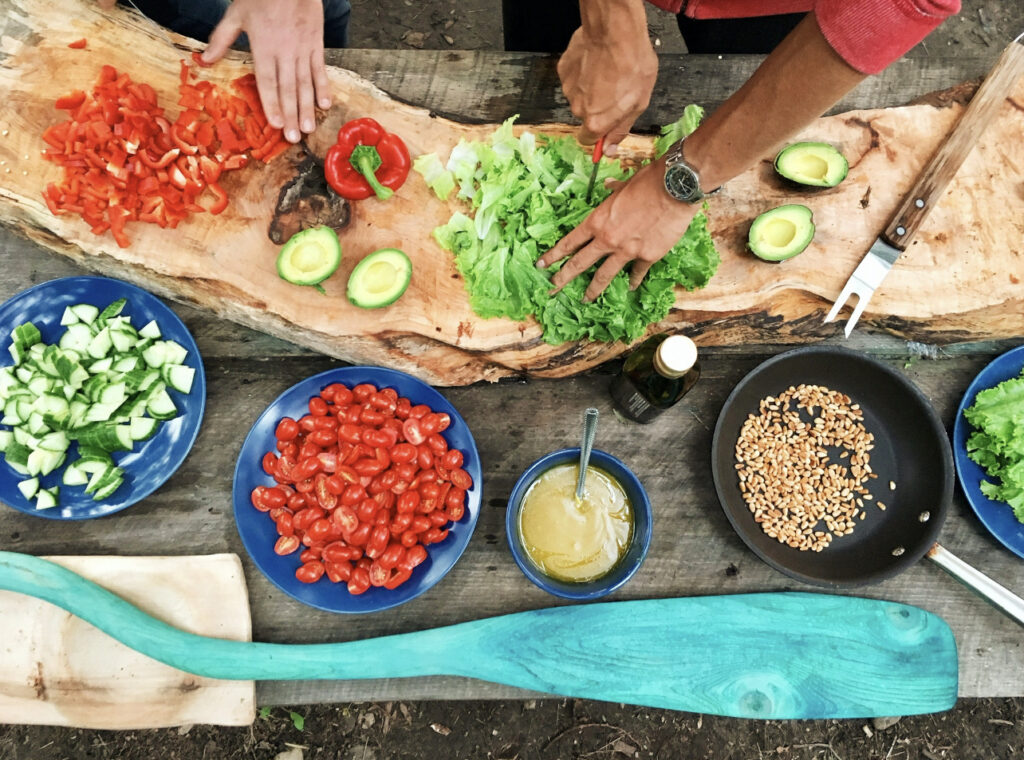
If cooking can be considered an art form, then my wife represents the Leonardo Da Vince school of gastronomy. I am from the Jackson Pollock school. Like Leonardo, my wife takes a scientific approach to the culinary arts. Before a single ingredient has met the wire of her whisk, Lisa has thoroughly mixed and folded a well-studied recipe into the broad and deep caldron of her intellect. Observing Lisa in a kitchen is like watching an organic chemist carefully following predetermined protocols with precision and purpose.
Unlike my methodical Leonardo Lisa, I am much more like a paint slinging modernist. I usually take whatever is laying around, and throw it together with whatever else is laying around to see if anything interesting and edible results from the combination.
Leftovers rather than cookbooks guide my recipes. A friend who observed the food rehabilitation clinic that I call cooking once asked me if I had grown up in The Depression. Upon reflection, I had to admit that my culinary creativity consists of at least two parts miserliness. But I also believe (rationalize?) that my approach comes from the reasoned conviction that some of the best flavors in a kitchen can be found in the leftovers.
For example, I inadvertently created a recipe a few years ago as I puzzled over what to do with the remnants of two half-full bottles of wine leftover from a party that were languishing in the refrigerator alongside four tired looking pears. Rather than pouring that wine down the drain, I emptied the bottles into a saucepan with plenty of sugar, cinnamon, cloves, and ginger. Next, I peeled and carved the brown spots out of the pears. I kerplunked them into the brew that was just now starting to bubble. Steamed and softened over a medium heat, the once tired fruit emerged rejuvenated, glistening and purple. Next, I slow-cooked the pear-flavored wine broth down into a thickened syrup.
At the last minute, I remembered the invasive mint vines in our vegetable garden that I periodically try to uproot and kill. After plating the pears, I doused each one with the warm, homemade wine syrup. Like a water lily, I floated a five-leaved mint blossom wherever the spiced purple had pooled on each plate. Just like that, leftovers and weeds destined for the trash heap became a dessert fit for a gourmand’s table.
A Seventeenth Century Carmelite who cooked for his community wrote a spiritual book entitled, The Practice of the Presence of God. Those seasoned cooks, practiced in divine Presence know that God is always collecting up the leftovers of our lives and folding them into some new unexpected recipe. Often, what we have judged to be as useless as a tired back-of-the-refrigerator dwelling morsel is precisely the ingredient that God has used to bring new flavors of meaning into our lives.
For example, over my decades of psychotherapy practice, I’ve been privileged to walk alongside clients who suffer from persistent anxiety. The journey starts the same way. The client would gladly cast away their suffering… if they could. Over time, something shifts. In the words of one of them I’ll call Beth, “You know I never would have chosen to be so anxious, but I’ll tell you that if it weren’t for anxiety, I never would have needed help. Anxiety led me to psychotherapy and a deeper sense of trust and a really concrete reliance on God.”
I have shared in the space of this article how I spent the decade of my twenties casting back and forth between the options of priesthood and marriage. While peers of mine were establishing careers, relationships, and families, I was attending extended retreats, spiritual direction, and psychotherapy trying to get over an underlying sense of inadequacy. I was also trying to get a sense of where God was calling my indecisive soul. In some instances, they would say it to me. In other instances I projected my self-perception onto them: “incapable of commitment,” they would say… or… “not making anything of myself.” But all the while something was slow cooking in me. Hanging out in prayer and reflection didn’t lead to the instantaneous decision for which I longed. But it did inadvertently lead to a deep intimacy with God, and a deeper understanding of the human condition with which I was constantly wrestling. I regularly draw upon the wisdom born of that suffering relative to my current vocations as husband, father, and counselor.
A stunning insight from this past Sunday’s celebration of the Eucharist is that God, the divine cook, uses everything from your life. Nothing gets left out. Even those ingredients that you had previously named, “useless,” or “leftover” are collected up and folded into a recipe that will one day deliver a surprisingly delicious and unexpected meaning. In the kitchen of Holy Mystery, all things work together for the good of those who believe in God’s ability to work with the humble ingredients of your life.

Another stunning and inspiring narrative. Thank you for sharing your experiences which hold for most of us. I have always admired your transparency and courage. You are a great help in forwarding my growth. Blessings on all you do!